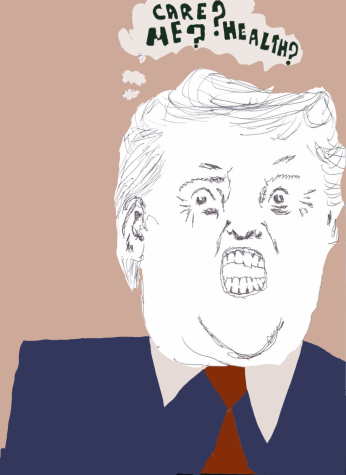Universal healthcare: Just for the president or a basic human right?
October 22, 2020
When President Donald Trump was hospitalized with COVID-19, he had access to healthcare that is not available for the vast majority of Americans, and he knows it.
After being released from the hospital, Trump insinuated through a series of statements that his free healthcare, paid for by taxpayer dollars, allowed for better care. He said, “It’s good to be president, I guess… Now, I have such great access to medicine… so many great doctors. So, it’s a lot easier for me than somebody that doesn’t have access to a doctor so easily, where it’s a big deal to see a doctor…”
Trump not only acknowledged that the treatment he received — which was paid for by taxpayer dollars — was of a higher level of care than given to the average American, but he also accidentally endorsed the need for universal healthcare.
It has been estimated that Trump’s COVID treatment cost the government 60,000 dollars of taxpayer money, a price that might significantly impact any other citizen who would have to pay this medical bill, even with insurance. We all know the heartwarming videos of COVID-19 patients finally leaving the hospital, sometimes after months of care, or of a cancer patient who finally went into remission. What is not so heartwarming is the large medical bills that will haunt them for years to come.

While the president may be entitled to the benefits of a universal healthcare system, the country in which he governs is not. The concept of universal healthcare, as described by the World Health Organization, is “ensuring that all people have access to needed health services (including prevention, promotion, treatment, rehabilitation and palliation) of sufficient quality to be effective while also ensuring that the use of these services does not expose the user the financial hardship,” has become highly politicized within the U.S., particularly when compared to other countries that have already introduced it into their systems. However, especially during a global pandemic, many are realizing that universal healthcare is not something that should be debated within the chambers of Congress. It should ultimately be a human right.
According to the U.S. Census, as of 2018, 8.5 percent of people are uninsured, meaning that 27.5 million people do not have access to sufficient medical care without extreme medical bills. This does not take into account the many people who are underinsured and are constantly screwed over by private healthcare providers. Universal healthcare would allow everyone access to the quality care they deserve, while simultaneously reconfiguring a system that does not provide care in a cost-effective way, without overcharging both hospitals and patients. The system we have now does not care about anything but the profit of large businesses and corporations.
The most popular proposal of universal healthcare is Bernie Sander’s proposal for Medicare for All. It is one of the more in-depth proposals we have seen for a universal healthcare system in the United States; it aims to cover every medical need for U.S. residents and undocumented people within the country. Sanders’ plan would not change the current infrastructure of doctors, hospitals and other health care providers; instead, it would nationalize the health insurance industry.
Sanders also directly challenges the idea that Medicare for All would be an extremely expensive endeavor, stating, “In 2015, the United States spent almost $10,000 per person for health care; the Canadians, Germans, French and British spent less than half of that, while guaranteeing health care to everyone.”
Right now, the United States is the leading example of what happens when adequate healthcare is neither accessible or affordable. The system we are living in allows turns people into collateral damage for the insurance industry’s quest to make a quick buck. Free healthcare should not only be accessible to the president of the United States; it should be accessible to everyone.




Thomas Pernick • Oct 24, 2020 at 5:15 pm
My Medicaid grant is til 2099exp would change effect my grant